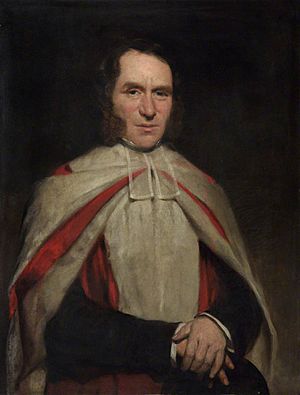Edwin Guest facts for kids
Edwin Guest (born September 10, 1800 – died November 23, 1880) was an English historian and expert on ancient times. People who study old things like him are called antiquaries. He was especially interested in the history of Britain.
Early Life and Studies
Edwin Guest went to school at King Edward's School, Birmingham. Later, he studied at Caius College, Cambridge, a famous university. He was very good at math, finishing as the eleventh 'wrangler' in his class. This meant he was one of the top students. After graduating, he became a 'fellow' at his college. This is like being a special member who helps teach and research.
He first trained to be a lawyer in 1828. After working as a lawyer for a few years, he decided to focus on his real passion. This was studying old things and doing historical research.
His Work as a Historian
In 1838, Edwin Guest published a very detailed two-volume book. It was called History of English Rhythms. This book explored the patterns and sounds of old English poetry.
He also wrote many important papers about Roman Britain. This was the time when the Roman Empire ruled parts of Britain. He gathered a lot of new information for a larger history book about early Britain. This book was published after he passed away. It was edited by Dr. Stubbs and named Origines Celticae in 1883.
Guest helped start the second version of the Philological Society of London in 1842. This society is a group of people who study languages and their history.
Leading at Cambridge University
In 1852, Edwin Guest was chosen to be the Master of Caius College. This is a very important leadership role at a university college. The next year, he earned a special law degree called an LL.D.. From 1854 to 1855, he served as the Vice-Chancellor of Cambridge University. This meant he was in charge of the entire university for that time.
Guest was also a Fellow of the Royal Society. This is a very respected group for top scientists and thinkers. He was also an honorary member of the Society of Antiquaries of London. This shows how much his work on history was valued.
 | Calvin Brent |
 | Walter T. Bailey |
 | Martha Cassell Thompson |
 | Alberta Jeannette Cassell |


